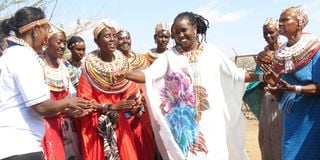Premium
Activists call for new ways to fight GBV

Women dance at Loglogo in Marsabit County during an assessment meeting on GBV on July 26, 2022.
Child rights advocates are calling for a change of approach in tackling rising cases of gender-based violence (GBV) affecting young girls in pastoral communities.
Despite the existence of laws to protect young girls from being subjected to such vices as early forced marriages and female cuts, the practice is still rampant among communities with entrenched cultural practices.
“We need to seriously rethink how to address the triple threats facing our girls. We have seen very sad stories of very young girls that have not had an opportunity to go to school merely because they were married off early,” said Ms Semerian Sankori, from Kajiado County.
“It is high time we engage the community at the grassroots wholly so that we have women driving this agenda and also include the elders to become advocates of the rights of the girl child.”
Ms Semerian spoke in Loglogo, Marsabit County, during a meeting convened for community women leaders to assess the extent of violence meted against women and girls by pastoralist communities and recommend effective ways to deal with it.
The meeting, convened by Pastoralist People’s Initiative, a local community-based organization, came two weeks after the Ministry of Health released a report titled “Triple Threats”.

Participants during an assessment meeting on GBV at Loglogo in Marsabit County on July 26, 2022.
Statistics announced by Health Cabinet Secretary Mutahi Kagwe in Nyeri town on July 13 indicated that there is an 85 percent increase in sexual and gender-based violence cases reported among adolescents aged between 10 and 17, with 16,746 cases reported last year, up from 2,466 in 2016.
And as if to amplify the extent of GBV among pastoralist communities, one of the participants who turned up for the Loglogo meeting was a married “woman” whose physique indicated she was aged about 15.
Though she produced a national identity card indicating 2003 as the year of birth, none of the participants were convinced that she could be aged 19.
“We came here to discuss how to address the problem of GBV including child marriage. We now feel heartbroken since a child who is hardly 14 and with a baby is among us. Children of her age are already in school and it makes us sad since this is supposed to be a women’s meeting, not a children’s meeting,” said Ms Agnes Leina, a child rights defender and a member of the Anti-FGM Board.
Forced marriages
Ms Leina, who has rescued dozens of girls from forced marriages and FGM in Kajiado County through her organisation Il'laramatak Community Concerns (ICC), said that though it was heartbreaking to see such a young bride, it was not shocking.
She said it was an open secret that such vices are being entertained by some communities who break the law with impunity while citing cultural beliefs and practices.
“Women here who are drawn from the Rendille community have given testimonies on how in the past they have rescued such girls from being married off. That is why we are calling on empowerment and greater involvement of such women in the villages to help us eliminate such deep-rooted cultural practices that are detrimental to the well-being of our young girls,” said Ms Leina.
Ms Margaret Super, who organised the two-day meeting, said mothers feel the pain their children endure and if trained and sensitised, they are best placed to carry out campaigns against gender-related violence in villages where some of the activities are carried out discreetly.
“We have formed a network within Loglogo ward which will bring women under one umbrella in the fight against gender violence. Our objective is to continue building their capacity so that they can speak with one voice against ills perpetrated in patriarchal societies against women and girls,” Ms Super said.
“However, we still need greater involvement and support from government and religious leaders in this fight so that it can be sustainable.”




